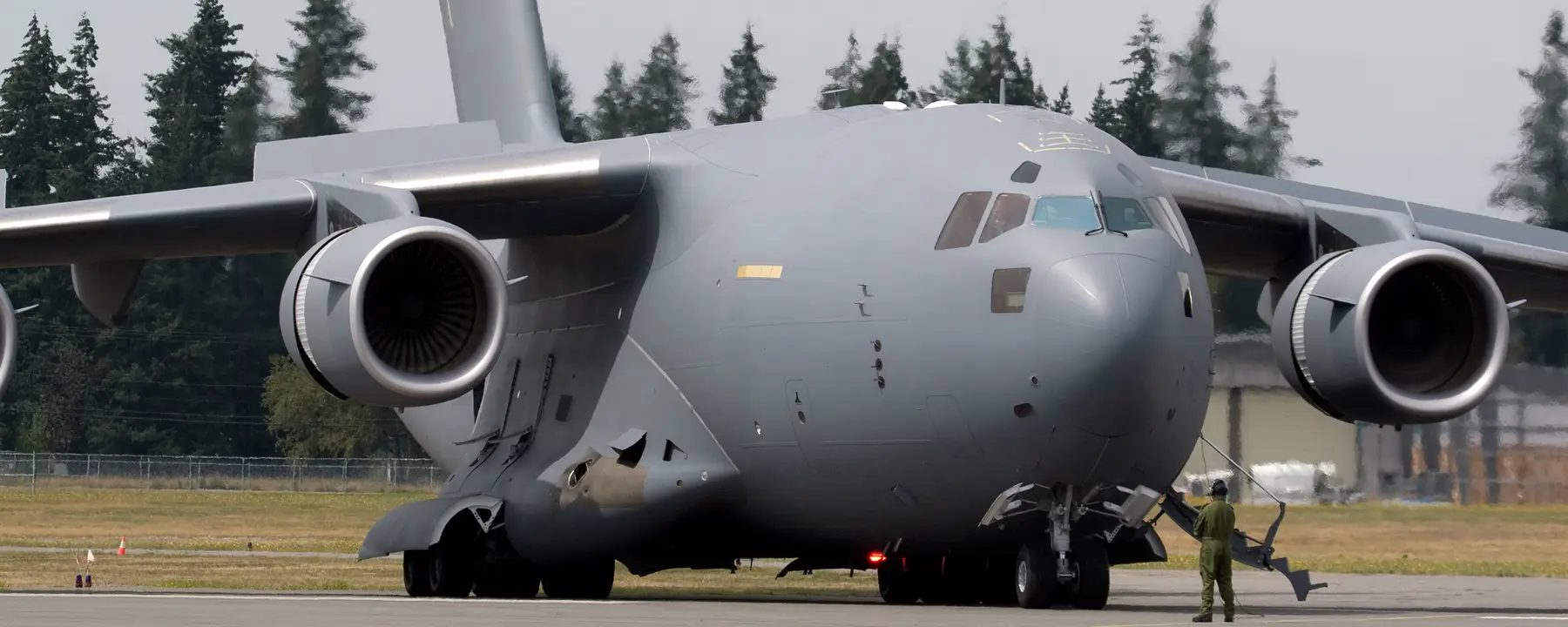Patient containment modules, air cleaners, and new PPE materials, tested by our experts, play vital roles in pandemic response
The pandemic that began in 2020 demanded a multi-pronged response by experts in public health, engineering, and microbiology, among others. RTI has long been a leader in interdisciplinary efforts of policy and technology development. At the first indications of the airborne transmission of COVID-19, we leveraged our ability to work with and test materials and systems that can keep this virus, and other contaminants, from spreading. Three projects related to the pandemic response show how we applied our knowledge of filtration systems to protect people from dangerous exposures.
Testing patient transport modules for use on military aircraft
The global spread of COVID-19 brought renewed attention to the need for transport methods of highly infectious patients to treatment facilities via airplane. The shared air supply on planes means viruses and other contaminants can travel among patients, caregivers, and members of the flight crew – who, unlike caregivers, do not wear masks and other protective equipment. All standard airplanes have air filtration systems, but they may not be sophisticated enough to effectively capture COVID-19 or other emerging threats.
During the Ebola outbreak of 2014-2016, RTI’s experts in the Aerosol Control and Protection Group played a key role in developing the Transportation Isolation System, a module that can carry up to six patients and their caregivers. The module is designed to be loaded onto a military transport plane. Its filtration system cleans the air inside the module and prevents viruses from transmitting through the ventilation system and potentially infecting any healthy people on board.
The Air Force is increasing its capacity to bring patients with COVID-19 back to the United States from abroad. Air filtration systems are essential, and they need to be tested for safety and effectiveness. RTI rejoined the effort in March, testing the air filtration of two systems that aimed to protect flight crews from airborne viruses: the Portable Biocontainment Care Module and the Negative Pressure Containment System.
To test the filtration and containment, we flow a salt aerosol through the system and identify both the filtration performance and any leak points. Working with a partner laboratory, the containment systems are subjected to vibrations from mild to violent that simulate flight and turbulence on the military’s C-17 and C-130 planes. Based on data from stress testing, we are able to recommend improvements to the system. Retesting, then, provides data for the military to certify safe usage for the systems that achieve high filtration and containment.
RTI has been providing fast turnaround assistance to the federal government for over 40 years, and this project was an outstanding example of our ability to respond quickly in a crisis. After receiving an urgent, high-priority request from the Defense Threat Reduction Agency, the team delivered initial data only two weeks from the day we received notice of the project. This allowed the vendor to make improvements and return the units to RTI for further testing. Qualifying patient isolation systems were found to provide better than 99.999% containment of all particles, including in the size range for infectious viral aerosols. Providing this level of containment, even under duress of violent shaking, is both an achievement and a comfort. Safe transport of multiple infectious patients not only helps us in the current pandemic but in the unforeseen next one.
Evaluating Air Purifiers for Bioaerosol Filtration Effectiveness
Air cleaning provides one of the needed layers of protection against the spread of COVID-19. High efficiency particulate air filtration, known as HEPA, is a sound way to provide this protection in patient isolation systems. However, it is expensive and hard to integrate into typical residential and office spaces.
An alternative to HEPA filtration is the use of air cleaners that disinfect the air. These standalone units can be placed in any occupied space, and cost less to maintain than HEPA systems. As we move toward reopening public buildings during the pandemic, air cleaners are more appealing than ever.
Air cleaners use one of a variety of methods to inactivate the airborne infectious microbes. Common examples include UV light and ionization. RTI previously developed the Clean Air Rate, microbial (CARm), to evaluate the effectiveness of in-room air cleaners. In our Dynamic Microbiological Test Chamber, we aerosolize less infective surrogate bacteria and viruses that simulate ones harmful to humans, then test to see whether the air cleaners effectively inactivate these microbes and deliver disinfected air.
Our CARm testing service is making an impact in the market for indoor air cleaners. We have provided testing to established companies as well as smaller ones working on new technologies. This collaboration will generate new options for keeping people safe from COVID-19 and other contaminants.
Applying Air Quality Expertise to the PPE Shortage
The Technology Advancement & Commercialization business unit at RTI has extensive experience studying and testing innovative protective garments and air-cleaning equipment for applications in air quality and first responder situations. We have studied airborne and infectious particles for nearly 40 years. When the pandemic hit, and supplies of personal protective equipment ran critically low, we mobilized.
We joined an effort by the Manufacturing Solutions Center in Conover, North Carolina, and the Economic Development Partnership of North Carolina to supplement the limited supply of N95 and surgical masks. Funded by the Coronavirus Aid, Relief, and Economic Security (CARES) Act, this effort focused on developing and testing alternative fabrics. Working on a pro bono basis, we helped evaluate early-run prototypes using our Particle Filtration Efficiency (PFE) and Biologics Filtration Efficiency (BFE) tests. As the pandemic stretches on, more textile companies have pivoted to PPE production, making our filtration labs a crucial link in the supply chain. Our portfolio now includes testing technologies and methods for evaluating the performance of PPE, in-room bioaerosol air cleaners, and ventilation systems for the general public, health care workers, and service members.
Our COVID-related work was not part of the original plan for 2020, but responding to urgent public health needs has always been part of our mission. We are proud to have contributed to solutions that will help the world weather this crisis and be better prepared for future challenges.
- Defense Threat Reduction Agency (DTRA)
- Advanced Functional Fabrics of America
- North Carolina State University Industry Expansion Solutions
- Confidential commercial clients
- Advanced Functional Fabrics of America
- Manufacturing Solutions Center at Catawba Valley Community College
- Economic Development Partnership of North Carolina
- North Carolina Manufacturing Extension Partnership



